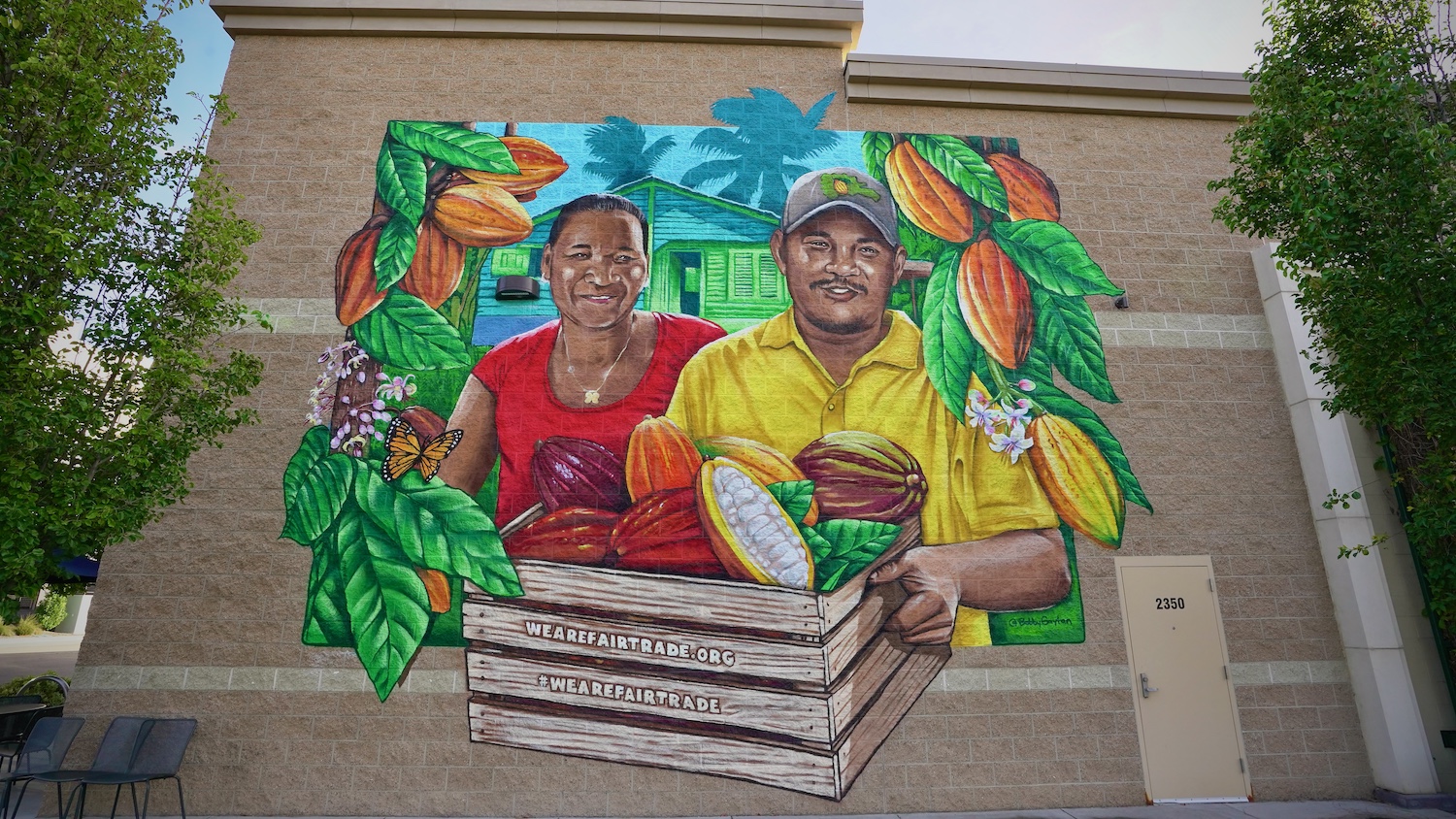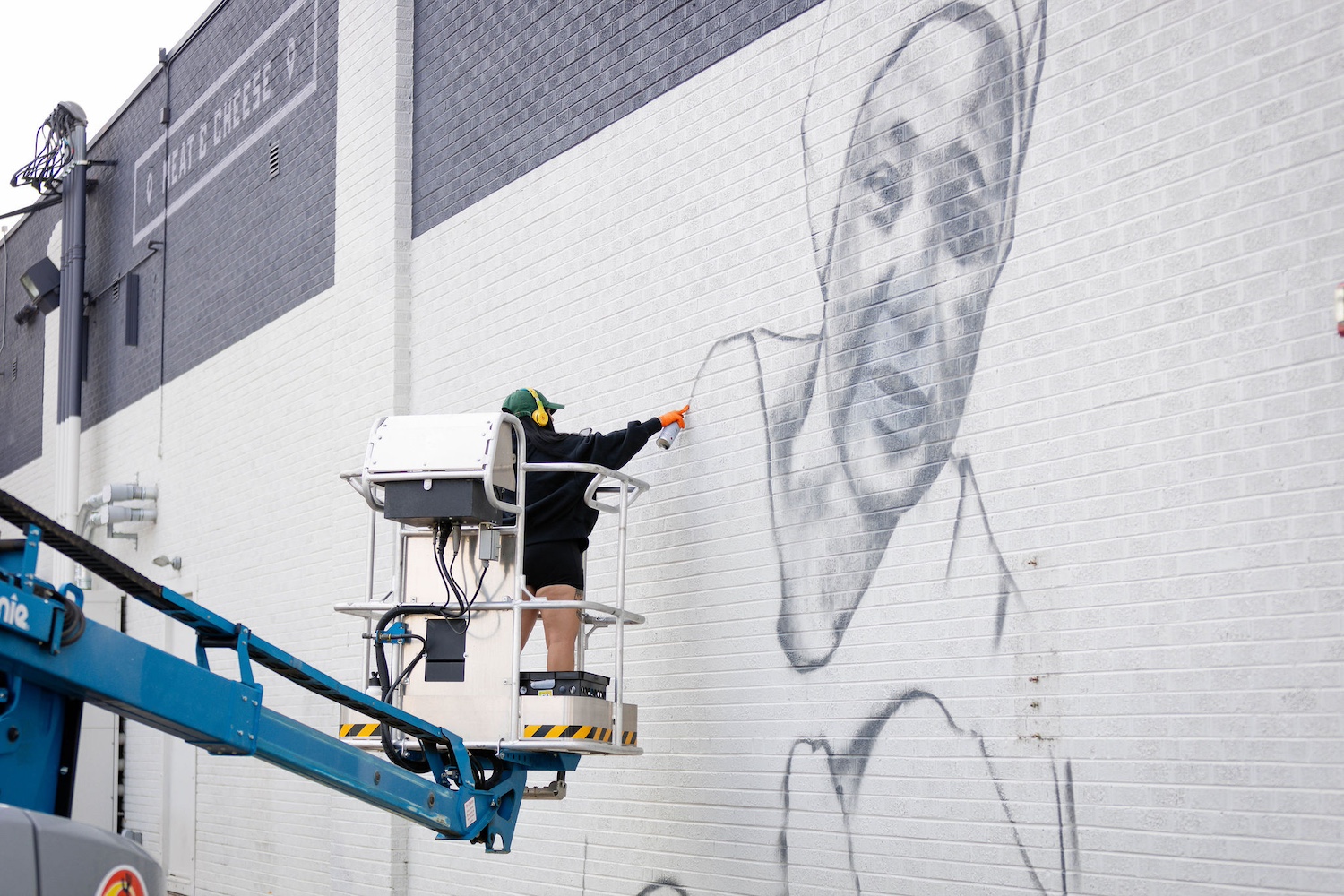
Fairtrade cocoa farmer Salamatu Katta is featured in a mural on the Leevers Locavore grocery store in Denver, Colorado. (Image courtesy of Fairtrade America.)
Salamatu Katta is a 29-year-old cocoa farmer in Sierra Leone breaking down gender and generational barriers by taking over her father’s cocoa farm. She cultivates her crop organically as part of the Munafa Cocoa Farmers’ Cooperative. What made a difference for Salamatu’s small business — with ripple effects for her community — is that she is a Fairtrade farmer. Now, her image is emblazoned on a huge mural outside a Denver, Colorado, grocery store, bringing her story to American consumers.
Katta’s mural is one of three murals across the United States that are part of Fairtrade America’s annual Fairtrade Month campaign. It connects shoppers, grocers, brands and farmers to celebrate their roles in enabling the Fairtrade system to thrive.
This year’s campaign is focused on ethical sourcing. Each mural depicts a farmer who grows Fairtrade-certified coffee or cocoa sold inside the store. For Katta, the cocoa she grows is an ingredient in products from chocolate company Hu Kitchen. In Boise, Idaho, the cocoa grown by Francisco Contreras and Carlixta Contreras Martínez is an ingredient in products from Navitas Organics. And in Buffalo, New York, the coffee grown by Ibu Rahmah is an ingredient in products from Gimme Coffee.

Beyond the colorful murals is the broader effort by Fairtrade America and the 70 U.S. Fairtrade-certified brands to support equity for farmers as they strive to create sustainable livelihoods for themselves and their communities, often against significant odds. There are over 2 million Fairtrade farmers and workers in certified cooperatives around the world. The certification ensures that products are grown in a way that supports sustainable livelihoods and safe working conditions, among other requirements.
“Storytelling is a really interesting and compelling way to encourage folks to slow down a little bit and think about other folks,” Kate Stritzinger, Fairtrade America’s director of marketing and impact, told TriplePundit. “The 'We are Fairtrade' campaign closes the gap between consumers and farmers. That's really the intention behind it.”
The three new murals join twelve others from previous years. Retailers that receive murals report a 75 percent increase in sales on Fairtrade products year after year, Stritzinger said. The organization also measures the potential reach of the campaign across all Fairtrade brands and retailers. In 2023, that was 70 brands and 2,000 retailers in the U.S. and Canada, and Fairtrade found that 92 percent of consumers show interest in learning more about the people who grow their food.
Fairtrade aligns with brand values
For Hu Kitchen, one of the participating brands in the 2024 campaign, celebrating Katta is emblematic of the company’s mission to support farming cooperatives and the livelihoods and communities they represent. Hu Kitchen sources 100 percent of its cocoa, coconut sugar, cashews, vanilla and quinoa on Fairtrade terms.
“By sourcing ingredients that are Fairtrade certified, we're hoping to better support the livelihoods of these Fairtrade farmers that grow the ingredients that make Hu products possible,” said Daniel Klausner, director of commercial strategy and impact for Hu Kitchen. “We've seen firsthand the positive impact that certification can have on the farming communities.”
The benefits of the Fairtrade system for brands and farmers fall into three buckets. First, Fairtrade farming organizations earn at least the Fairtrade Minimum Price, which varies based on things like the product, the quantity and the region it is grown in. That standard acts as a safety net for producers when the market prices are low and is especially important at a time of great market volatility in food prices.
“All of the stakeholders in the food system deserve fair pay, but some have more power in dictating their terms,” said Andrew Beck, director of procurement at Hu Kitchen. “Farmers often have the least power and as such they earn less than is fair. And often, that means less than is needed to reinvest in their farms or their families … When farmers aren't treated equitably, supply chains fall out of balance, and ultimately, that impacts everybody along the way, including customers.”
Farmers also receive the Fairtrade Premium, an additional sum of money that farmers and workers invest in projects of their choosing. The premium is calculated as a percentage of the volume of produce sold, and cooperatives decide democratically how they want to reinvest. That could be in more training and development or resources to improve farms and local communities, such as a seedling nursery, a new road or bridge, a health clinic or a maternity ward. In 2022, the Fairtrade Premium reached a record high of about $240 million USD.
And not least, by having the Fairtrade mark on their products, brands show a commitment to the system, with the aim of expanding the network to more brands and more farmers who can benefit.
Since Hu Kitchen was Fairtrade certified in 2021, it has paid more than $1 million in Fairtrade premiums across all of its ingredients, Beck said. “That’s a million dollars that have gone to farmers like Salamatu and her community,” he said.
Katta is a member of the Munafa Cocoa Farmers’ Cooperative, which cultivates all of its cocoa organically. Her cooperative opted to use its premium to cover the cost of underbrushing work on the farms. Underbrushing is the process of removing weeds that compete with cocoa trees for water and nutrients. Katta also created economic opportunities for members of her community by hiring them to do the work.
“Salamatu has dreams of being an entrepreneur that can support not just her own future, but the future of her community, and we are glad to be supporting that,” Klausner said.

"This isn't just for big brands"
On a mural outside the Lexington Co-op grocery store in Buffalo, New York, shoppers can learn about the coffee grown by Ibu Rahmah that’s sold inside. Gimme Coffee, an employee-owned cooperative based in Ithaca, New York, that sells specialty coffees, sponsored the mural. Of all the coffee they source, 95 percent is certified Fairtrade.
Highlighting Ramah’s story is an opportunity to underscore why Gimme Coffee chose to be Fairtrade certified.
“Frankly, this makes us an anomaly in the specialty coffee world,” said Colleen Anunu, co-managing director and head of product development at Gimme Coffee. “But we want to put this in front of customers to say this isn't just for big brands. This is a tide that lifts all ships. That’s why we engage with Fairtrade the way that we do.”
Ramah is “a total powerhouse, a standout individual,” Anunu said. “She has had to combat gender inequity in a region that doesn’t allow women to own certain lands or make decisions about agricultural production and. in many ways, are treated like the property of their husbands. For Ibu Ramah to own her own business is a phenomenal feat. She has pushed the culture to allow women to own coffee trees, to own bank accounts, to have say in decision-making in their households and how they spend their money and how agriculture production is brought to market. She has done so much for that area.”
Support of Fairtrade farmers is also a reflection of Gimme Coffee’s own democratic structure as an employee-owned company, Anunu said. “As a cooperative ourselves, it's super important to us that we're also working with suppliers that have democratic control through its membership in cooperatives. The Fairtrade brands have no influence over how the farmers spend their money from premiums. It really is a community-led effort.”
One part of the solution to a multifaceted problem
Taking part in the Fairtrade system has direct, positive impacts on farmers’ livelihoods, but it is just one solution to the multifaceted challenges facing farmers and communities in many places around the world.
The global food system is complex, exacerbated by issues like climate change and global instability. Massively insufficient infrastructure like roads and bridges or communities struggling with intergenerational poverty are issues beyond the scope of what an organization like Fairtrade can resolve.
“But our work with Fairtrade is a step in the right direction,” Beck of Hu Kitchen said. “We know that putting more money in farmers' pockets allows them to invest where they believe they should be investing and supports their livelihoods best. That’s something we stand behind fully.”
Fairtrade America's Stritzinger seems to agree. “When you think about the chronic underpayment of farmers, the increased impact of climate change, and the prevalence of corporate greed here in the U.S., the problems farmers face are getting bigger,” she said. “And we haven’t even fixed it at the root level, which we see as pricing. So, we have to build the ship and sail it at the same time. Farmers know what they need. They just need the resources to tackle the problems themselves. They're way closer to the problems and to the solutions.”
On the consumer side, getting more people to buy Fairtrade products is about access and visibility, Stritzinger said.
“Our research shows that when consumers get the choice, they choose Fairtrade,” she said. “We’re a known entity. We’ve seen a 118 percent increase in awareness of Fairtrade in the U.S. in the past four years alone … We’re optimistic that once we get more products on shelves, we can deliver more impact for farmers.”

Based in Florida, Amy has covered sustainability for over 25 years, including for TriplePundit, Reuters Sustainable Business and Ethical Corporation Magazine. She also writes sustainability reports and thought leadership for companies. She is the ghostwriter for Sustainability Leadership: A Swedish Approach to Transforming Your Company, Industry and the World. Connect with Amy on LinkedIn and her Substack newsletter focused on gray divorce, caregiving and other cultural topics.














